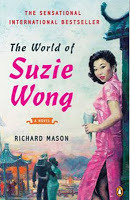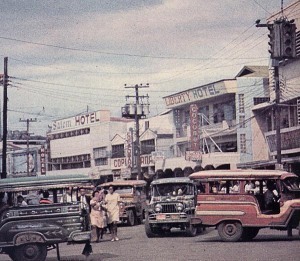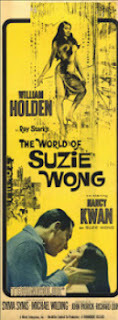Remembering Suzie Wong
 Yesterday, USA Today told its readers that Penguin is re-releasing Richard Mason's bestselling 1957 novel
The World of Suzie Wong
(on January 31) with its original cover artwork by James Avati. I read the book and saw the William Holden/Nancy Kwan film adaptation (1960) when I was in high school.
Yesterday, USA Today told its readers that Penguin is re-releasing Richard Mason's bestselling 1957 novel
The World of Suzie Wong
(on January 31) with its original cover artwork by James Avati. I read the book and saw the William Holden/Nancy Kwan film adaptation (1960) when I was in high school.As a teenager living in the Florida panhandle, the worlds of sailors, sailor bars, and hourly rental hotels in Hong Kong were many worlds away in terms of my piney woods and college town experience. Other than books and movies--some of which my parents didn't want me to read/see--I led a sheltered life, I guess.
In Richard Mason's story, an architect named Robert Lomax (played by William Holden in the film) moves to Hong Kong where he hopes he can figure out how to become an artist. He meets Suzie Wong (played by Nancy Kwan) because he checks into a cheap hotel, not knowing at the outset that most of the men who stayed there rented rooms by the hour.
As a writer to be, I saw parallels between the outlook of Robert Lomax and myself. Exotic locations, exotic women and the struggles of writers and artists were all tangled up in my imagination. I was too young to know that the "prostitute with a heart of gold" was a very old theme. More of a myth, actuallty, though the prospective wonderment of it might have been influenced by my schoolboy crush on actress Nancy Kwan.
The Seedy Realities
 In 1957, I couldn't have predicted that eleven years later I would be a sailor in Hong Kong, Japan and the Philippines and see first hand that the world of bargirls and sailors was for the most part harsh, seedy and dark. The old hands aboard ship knew the bars in every port and they felt quite strongly that green recruits who were assigned to the ship just out of bootcamp needed a tour.
In 1957, I couldn't have predicted that eleven years later I would be a sailor in Hong Kong, Japan and the Philippines and see first hand that the world of bargirls and sailors was for the most part harsh, seedy and dark. The old hands aboard ship knew the bars in every port and they felt quite strongly that green recruits who were assigned to the ship just out of bootcamp needed a tour.What I saw was nothing to dream upon, as you might guess from this picture of the bars in Olongapo, Republic of the Philippines. The sailors were drunk and profane. The girls were expedient and provocative. The men worshipped easy sex ("If you're not in bed by 9 o'clock, you might as well go back to the ship") and the girls worshipped the money ("You want me to be your honeyko in air conditioned hotel, I love you good for your Navy money.")
When I showed no interest, one girl threw a beer at me (it missed), another threatened me with a knife, several scratched my neck, one tried to steal my ID card and my dogtags, and many told jokes in mixtures of English, Chinese, Japanese and Tagalog. The Filipina girls said I was discounting them in favor of "those whores" in Japan. The Japanese bargirls were overtly nasty at the idea that I was probably spending my Navy money in the Wanchai district of Hong Kong.
The Magic Words: "I'm Engaged"
 Once they knew I was engaged, I was considered off limits. No hassle, no threats. I was amazed at how the conversation changed from sex/booze/hotel to dreams, homes, children, regular jobs and the weather. The Suzie Wongs in the bars where I hid away from the world and captured impressions in Blue Horse composition books (for the great novels I planned to write) sat next to me and kept away all the preditors. "This writer man engaged, get lost slut!"
Once they knew I was engaged, I was considered off limits. No hassle, no threats. I was amazed at how the conversation changed from sex/booze/hotel to dreams, homes, children, regular jobs and the weather. The Suzie Wongs in the bars where I hid away from the world and captured impressions in Blue Horse composition books (for the great novels I planned to write) sat next to me and kept away all the preditors. "This writer man engaged, get lost slut!" The Navy wrenched me away (against my will) from everything I knew and I learned to keep my clinical depression at bay by being a very quiet loner. My letters home sounded like the old me and were filled with shipboard doings and the sites I saw on special services tours in every port. I said nothing about the Blue Horse notebooks or the tables in the backs of smoke-filled bars. Naturally, I didn't mention the "guardian girls" who sat at my table and kept the rest of the world away.
I haven't forgotten their names, though they would have forgotten mine soon after the last time I was in any of those sailor bars. Those "clubs" were, after all sailor bars, and there were thousands of guys and thousands of names, and most of the sailors who stopped by for a drink and a cigarette never went away with a girl, much less actually talked to them. Men had a few drinks and moved on. Some of us stayed in one place for hours, in the dark and rather invisible to the madding crowds.
Those who noticed us, assumed we were stoned or drunk, and except for Suzy Wong, I saw no reason to correct their impressions. Those days are a blur that I remember in precise detail. I fictionalized some of that detail in my novel Garden of Heaven: an Odyssey . But otherwise, I usually keep it to myself because most interactions in the sheltered world of a writer don't lend themselves to saying "Suzy Wong's quiet conversation in a smoke-filled bar saved my life."
It's nice to see The World of Suzie Wong coming out in a new edition. But I won't read it again because my memories are still crystal clear.
--Malcolm
Published on January 28, 2012 12:48
No comments have been added yet.



